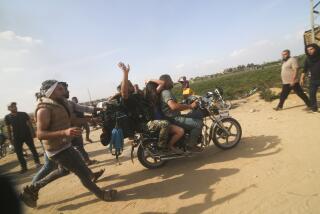Group Says U.S. Sent Up to 150 to Possible Torture Sites
- Share via
WASHINGTON — A civil liberties group investigating allegations of prisoner abuse will report today that since the Sept. 11 attacks, U.S. agents have secretly transported up to 150 detainees to countries that may practice torture.
Such transporting, known as rendition, is more widespread than the government has reported, according to Human Rights Watch. In a report issued a year after the earliest revelations of the Abu Ghraib prison abuse scandal, the group said the renditions, along with abuses of foreign detainees by U.S. forces, were possible violations of international law.
The group also said an Army investigation clearing top U.S. military commanders of wrongdoing in the scandal at Abu Ghraib in Baghdad established the need for an outside inquiry.
“This just proves the military can’t investigate itself,” said Reed Brody, a lawyer for Human Rights Watch, which monitors civil rights issues around the world. “It seems like another in a long line of attempts at self-absolution.”
Brody’s organization and the American Civil Liberties Union are among the groups that have sought the appointment of a special counsel to investigate U.S. detention practices since a string of Pentagon inquiries found few cases of wrongdoing, especially in higher military ranks or among civilian officials.
Revelations on Friday that an upcoming report by the Army inspector general would exonerate Lt. Gen. Ricardo Sanchez, the former chief U.S. commander in Iraq, and three other top officers proves the inadequacy of the military’s probes, the rights groups said.
“These findings only show that the president must appoint a special counsel -- who is not beholden by rank or party and who is able to look up the military chain of command,” said ACLU Executive Director Anthony D. Romero in a statement Saturday.
The Human Rights Watch report comes amid growing concern on Capitol Hill over sending prisoners to countries such as Syria and Egypt, which are widely believed to torture prisoners for interrogation purposes.
The Bush administration has acknowledged that renditions have occurred, but officials at the CIA and elsewhere have not definitively said how many captives may have been detained by the United States in one country, then clandestinely flown to a third nation.
Former CIA Director George J. Tenet has said his agency took part in more than 70 renditions before Sept. 11, but he has not made clear whether any involved sending detainees to countries that permitted torture.
His successor, CIA Director Porter J. Goss, testified in February before the Senate Intelligence Committee that experts did not believe prisoner abuse was an effective way to get information.
According to Goss, when prisoners are transferred, the U.S. “seeks assurances” that they will not be mistreated.
Last week, Sen. John D. Rockefeller IV (D-W. Va.), vice chairman of the Senate Intelligence Committee, urged a separate congressional review of how the CIA detained and interrogated prisoners.
Human Rights Watch said its determination that there were 100 to 150 renditions was based on its own investigative work and media reports from around the world.
The organization cited some examples as part of the release of today’s report:
* Maher Arar, a Syrian-born Canadian, was picked up by U.S. authorities at a New York airport, flown to Jordan and driven to Syria, the group said. After being released 10 months later, he described “repeated torture, often with cables and electrical cords, during his confinement in a Syrian prison.”
* Swedish officials turned over two Egyptians, Ahmed Agiza and Mohammed al-Zari, to U.S. officials. The men were allegedly hooded, shackled and drugged, placed aboard a U.S. government-leased plane and flown to Egypt. “The two men were reportedly tortured, including in Cairo’s notorious Tora prison,” Human Rights Watch said.
* Osama Moustafa Nasr of Milan, Italy, has complained that Americans seized him and flew him to Egypt. There, he has said, the secret police beat him so badly that he lost hearing in one ear.
The organization said it did not know how many other cases there might be or what had happened to most of the other detainees “rendered” to other countries.
“These are the only ones we can document,” Brody said.
More to Read
Sign up for Essential California
The most important California stories and recommendations in your inbox every morning.
You may occasionally receive promotional content from the Los Angeles Times.











